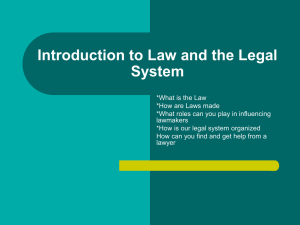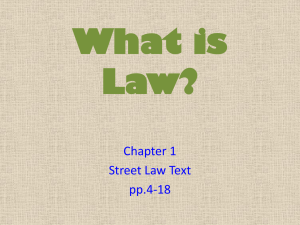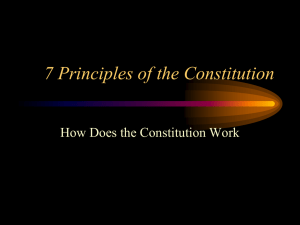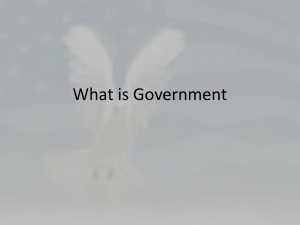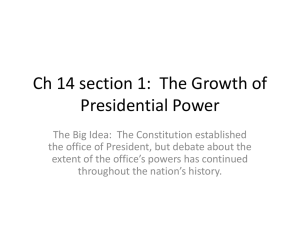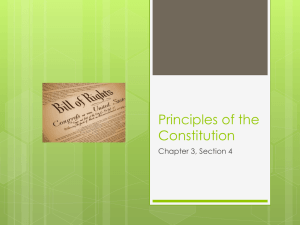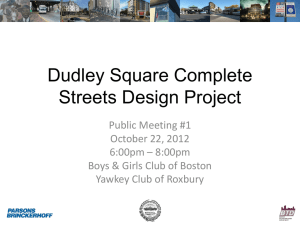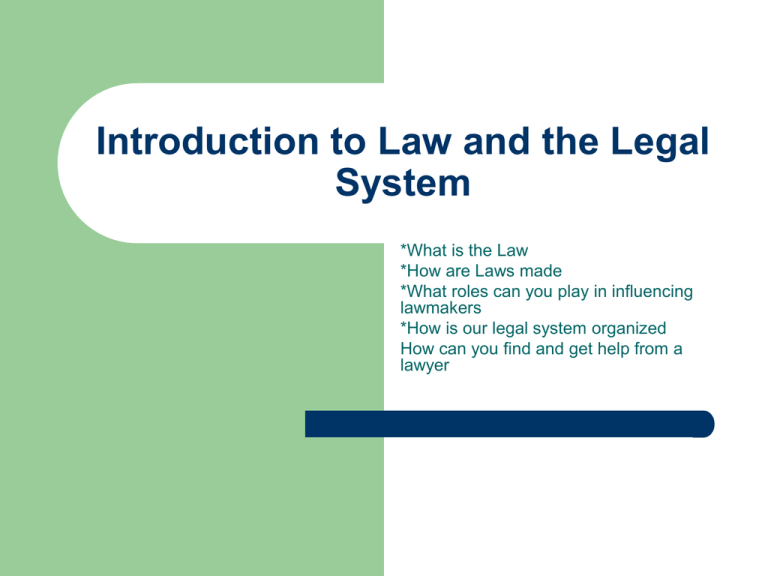
Introduction to Law and the Legal
System
*What is the Law
*How are Laws made
*What roles can you play in influencing
lawmakers
*How is our legal system organized
How can you find and get help from a
lawyer
What is LAW
Laws are the rules and regulations made and
enforced by government that regulate the
conduct of people within a society
Every society over existing has recognized
the need for laws
Not all laws are fair or even good
“Rule of Law” means our society respects the
laws. NO ONE IS ABOVE THE LAW!!!!!!
Law and Values
Reflect and promote a society’s values
Influenced by our society’s traditional ideas of right
and wrong
Our legal system aims to achieve many goals
–
–
–
–
–
–
–
Protecting basic human rights
Promote fairness
Help resolve conflict
Promote order and stability
Promote desirable social and economic behavior
Present the will of the majority
Protect the rights of the minority
Shipwrecked Sailors
Get into groups of 3 or 4
Read Page 6 (as a group)
Discuss the questions (a-f)
Class Discussion will follow
The Shipwrecked Sailors
p. 6
1)
2)
3)
4)
5)
6)
(Problem 1.2 a-f)
Should Dudley and Stephens be tried for murder? Explain
As an attorney for Dudley and Stephens, what arguments would you
make on their behalf? As an attorney for the government, what
arguments would you make on the government’s behalf?
If Dudley and Stephens are convicted, what should their punishment
be?
What purpose would by served by convicting Dudley and Stephens?
What is the relationship between law and morality in this case? Was
it morally wrong for Dudley and Stephens to kill Brooks? Explain
your answer
Can an act be legal but immoral? Can an act be morally right but
unlawful? Explain
A Difficult Balance
•
•
•
Achieving the goals while minimizing conflict
Balancing rights with responsibilities
Majority Rules vs. Minority Rights
4 Areas of Law
•
•
•
•
Moral (Murder, Robbery, Assault)
Economic (Stealing, Forgery, Identity Theft)
Political (Voter Fraud, Treason, Spying)
Social Values (Illegal Drugs, Education)
–
–
These things can change over time
These things can be situational
Laws
Many laws combine moral, economic,
political and/or social values
Many believe laws can solve all problems
Some laws designed to protect one set of
values infringe on another
Review – What is Law?
Why do we have laws?
What are 4 areas laws are based on?
How can laws conflict?
Quick Review
1) Identify a problem for which we need a
law. Explain your answer
2) Identify an existing law that is not
necessary today. Explain your answer
3) What 4 areas laws are based upon?
Human Rights
The rights all people have simply because
they are human beings.
Both governments and individuals can violate
human rights
Human rights apply at home, school, work,
everywhere
Bill of Rights - US Constitution
Rights to Free Speech, Press, Religion, Assembly and Petition
Right to Bear Arms
Right to NOT Quarter Troops
Right AGAINST Unreasonable Search and Seizure
Rights of the Accused Person
Rights to a Fair Trial
Right to Civil Suits
Rights AGAINST Cruel and Unusual Punishment
Rights Reserved to the People
Rights Reserved to the States
Universal Declaration of Human Rights
A statement of basic human rights and standards for
government that has been agreed to by almost every
country in the world.
All people have the right to liberty, education,
political and religious freedom and economic wellbeing
UDHR bans torture
UDHR says that all people have the right to
participate in their government process
United Nations on UDHR
The International Covenant on Civil and
Political Rights
–
–
Protects the freedoms of speech, religion, and
press
Protects the right to participate in government
United Nations on UDHR
The International Covenant on Economic,
Social and Cultural Rights
–
Provides for the right to adequate education, food,
housing, health car, protection of property and
employment in sate conditions at an adequate
salary
United Nations on UDHR
The Convention on the Rights of the Child
–
Spells out basic human rights to which children
everywhere are entitled, including the right to
education and to be free from exploitation
Balancing Rights with Responsibilities
“With every right comes responsibility”
–
If you believe in every person’s right to a fair trial, you must be
willing to serve on a jury
“Just because you have the right to do
something does not mean it is right to do it.”
- You may have the right to say something hateful about someone,
but you shouldn’t. It is morally wrong
"The right to swing my fist ends where the
other man's nose begins." - Oliver Wendell Holmes
Quick Review
What are “Human Rights?”
What document address these rights in the US
Constitution?
What document(s) address these in the world?
What is meant by “balancing rights with
responsibilities?”
Human Rights - USA
Assume the following events take place in the US. Decide if each is a human
rights violation.
Before class starts, the teacher says, “You can’t pray in school.”
A child goes to sleep hungry because the parents have no money for food
A student receives a poor education in her high school and is rejected for every job for which
she applies
A man is stopped before boarding a plane and is strip-searched because he has an Arabsounding name and a stamp on his passport indicating that he has been to Iraq in the past
year
A Spanish-speaking student speaks Spanish to another student. The principal tells the
students that only English may be spoken in school.
A woman is ill and is turned away from a hospital because she does not have health insurance
or the money to pay her medical bill.
A homeless man asks for money from people passing by, but people do not give him any
money.
A Muslim high school girl wears a hijab (head scarf) to school. The teacher tells her to remove
it during class, as there is a rule against hats or other head coverings in the building
A family moves to the US from another country where it is part of the culture for the wife to
stay at home and take care of the household. The husband comes home from work and finds
that his wife has not done the laundry or cooked dinner. He disciplines her by striking her
three times, the usual method of discipline in their culture.
Kinds of Laws
Criminal Laws
–
–
–
regulate public conduct and set out duties owed to society
can only be brought by the government against a person charged with committing a
crime
Penalties include imprisonment, fines, being placed under supervision or other
Felony – more serious crimes with penalty of one or
more years in prison
Misdemeanor – less serious crimes with penalty of less
than one year
Kinds of Laws
Civil Laws
–
–
–
–
Regulate relations between individuals or groups of
individuals
Lawsuit can be brought by a person who feels
wronged/injured by another person
Courts may award the injured person money for the loss,
order the person who committed the wrong to make amends
in some other way
Regulate everyday situations like divorce, contracts, real
estate, insurance, consumer protection, etc
Legal Terminology
Defendant: the person accused of the crime
Plaintiff: the person or company that was harmed
Prosecutor: the government attorney trying to prove the
defendant guilty
Defense Attorney: represents the defendant; is charged with
creating reasonable doubt or getting the best deal for their
client
Reasonable Doubt: a level of doubt reasonable to question the
guilt of the defendant
Preponderance of Evidence: the jury only needs to believe the
defendant more that likely did what he/she is accused of
Matt & Kenji
Matt and Kenji decide to skip school. They take Kenji’s brother’s car without
telling him and drive to a local shopping center. Ignoring the sign “Parking
for Handicapped Persons Only” they leave the car and enter the electronics
shop.
After looking around, they buy an MP3 player. Then they buy some
sandwiches from a street vendor and walk to a nearby park. While eating,
they discover that the MP3 player does not work. In their hurry to return it,
they leave their trash on the park bench.
When Matt and Kenji get back to the shopping center, they notice a large dent
in one side of their car. The dent appears to be the result of a driver’s
carelessness in backing out of the next space. They also notice that the car
has been broken into and that the satellite radio has been removed.
They call the police to report the accident and theft. When the police arrive,
they seize a small, clear bag containing illegal drugs from behind the car’s
backseat. Matt and Kenji are arrested.
Matt and Kenji Questions
1)
2)
3)
List all the things you think Matt and Kenji
did wrong.
What laws are involved in this story?
Which of these are criminal laws?
Which are civil laws?
Our Constitutional Framework
Key Principles (methods of limiting the power)
–
Limited Government:
–
Separation of Powers:
–
Checks and Balances:
–
Judicial Review:
Specific powers are granted to the government and
specific powers are prohibited to the government
Three branches of government were created to
break up the power given to the central government
Each of the three branches have ways to “check” or
keep an eye on the other branches to make sure they are not abusing their power
The power of the courts to rule acts of the government
unconstitutional
–
Federalism:
The federal and state governments have specific powers reserved
to that level of government
Limited Government
The writers of the Constitution knew they
needed more power in the central
government but were afraid that power would
be abused. So they imbedded methods to
limit how the powers were distributed so it
would be very difficult for that power to be
used to infringe on the rights of the citizens
Separation of Powers
3 branches of government
Each branch had a specific job within the
function of the government
Checks and Balances
Each branch has a way to “check” the other
two branches
–
Legislature :
E=impeach
J=confirms nominations
–
Executive:
L=veto
J=nominates judges
–
Judicial:
L=can declare acts unconstitutional
E=can declare acts unconstitutional
Judicial Review
The Supreme Court can declare any action
of the government unconstitutional
This protects the citizen’s rights
Federalism
Separates governmental powers between
state and federal government
Article 1, Section 8 lists specific powers the
federal government/Congress has
Amendment 10 reserves all other powers to
the state governments
The Bill of Rights
The US Constitution limits government by the
4 methods we have been talking about
The Bill of Rights establishes the rights of the
citizens. These rights cannot be taken
unless the citizen abuses those rights. And
then only if the government goes through
DUE PROCESS OF LAW
Quick Review
•
•
•
•
What is the difference between criminal law
and civil law?
What is the difference between a
misdemeanor and a felony?
What do they call the lawyers for each side in
a trial?
What are the 5 ways powers were limited in
government in the Constitution?
Chapter One
“Need to Knows”
* What is LAW
• Goals of the Legal System
• 4 Areas of Law
• How Laws conflict
• Human Rights
•
UDHR
• Bill of Rights
•
•
Criminal/Civil Law (felony/misdemeanor)
Key Principles of Limiting Government
Chapter One Essay Questions
(choose 2 of the following for your test)
1)
Why do we have laws? Explain what you think it might be like
if we did not have any laws.
2)
What are “Human Rights” and why are they important to
protect worldwide?
3)
Explain the difference between a misdemeanor and a felony.
How do they decide if a crime is a misdemeanor or a felony?
4)
Identify 3 things built into our Constitution/government that
place a limit on governmental power. Explain how these keep
the people in control of the power in the United States.
Scripted Trial
Trial
–
–
–
Pre-read your part
“ACT” your part, as best as possible
Be ready to vote on guilty or innocence of defendant
Jury
–
–
Participant
Member
Take notes on what witnesses said
Be ready to discuss the guilt or innocence of the
defendant

